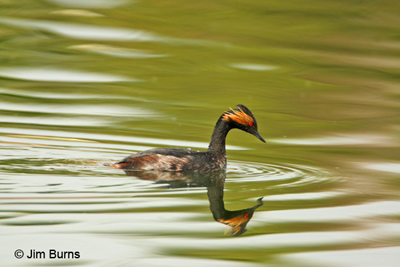
It’s now been ten years since that first column on October 7, 2005--“A Pathway to Nature” jimburnsphotos.com/pages/10-5-05.html. Having just finished rereading Hemingway’s Green Hills of Africa, written in a time when some natives encountered on his safari were still using spears and atlatls, that book seemed an appropriate subject for the tenth anniversary of “Bird Is a Verb,” my column so inauspiciously launched by an intellectually lazy newspaper editor.
Hemingway was many things, primarily and arguably the best American writer of his generation if not the twentieth century, an alcoholic suffering from depression, a romantic chronicler of war, travel, and the human condition. Unfortunately an integral facet of that human condition is that well-meaning people and countries do things not recognized as evil until viewed through the prism of history. There is a trenchant passage near the end of Green Hills in which Hemingway acknowledges this without a hint of the irony a reader may see in his love affair with Africa.
A continent ages quickly once we come.
Ironic, and purely coincidental, that I am reading Hemingway within days of the illegal killing of Cecil the Lion in Zimbabwe by a Minnesota dentist. And because the white hunter who arranged the Cecil hunt has just been busted for smuggling Sable Antelope out of Zimbabwe, more’s the irony that Hemingway’s ruminations follow his successful hunt for Sable Antelope which brings the safari to a close.
When I originally read Green Hills a lifetime ago, it spurred a desire to someday travel in Africa. Now that health and safety concerns have scrubbed the “dark continent” from my bucket list, I find that Hemingway’s constant references to his drinking, his chronicles of the competition between the white hunters for the best trophy heads and horns, and their condescension toward their native guides and gunbearers grows tedious and scrubs the romance from the book.
In the final pages of the story, on their way home from Africa, the hunting party stops for lunch overlooking the Sea of Galilee, and Hemingway notes the large number of grebes on the water—I was counting them and wondering why they never were mentioned in the Bible. I decided that those people were not naturalists. Maybe you need that prism of history to detect irony. Back in the day, “naturalist” was apparently just anyone who enjoyed nature and being outside. Here (in Africa) I could shoot and fish. That, and writing, and reading, and seeing pictures was all I cared about doing. Presumably he meant pictures of nature and of course drinking should have made his list.
Ten years ago in “A Pathway to Nature” I noted that “bird” had evolved from just a noun, passive, to a verb, active. I hope and believe “naturalist” has had a similar evolution. Here’s Hemingway again—The natives live in harmony with it . . . but the foreigner destroys . . . the earth gets tired of being exploited . . . a country quickly wears out . . . the machine can’t reproduce . . . and it eats what (man) cannot raise . . . a country was made to be as we found it.
I highly recommend a reading of Green Hills of Africa. Then it was romantic travelogue. Now it is perverse irony. You can enjoy it both ways.